Module 4 Life in the future Unit 3 Language in use(共24张PPT)
文档属性
| 名称 | Module 4 Life in the future Unit 3 Language in use(共24张PPT) |
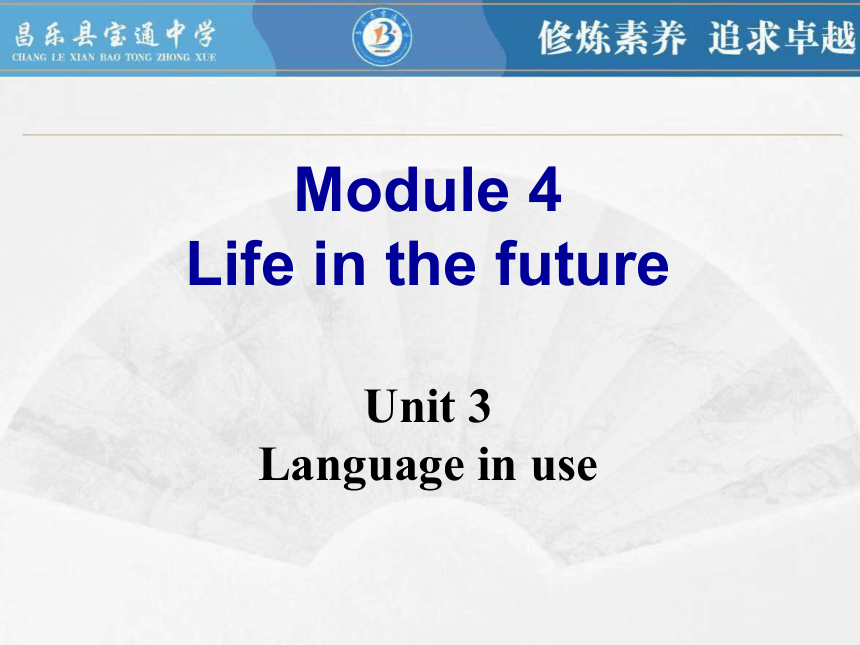
|
|
| 格式 | zip | ||
| 文件大小 | 269.7KB | ||
| 资源类型 | 教案 | ||
| 版本资源 | 外研版 | ||
| 科目 | 英语 | ||
| 更新时间 | 2023-03-27 15:19:13 | ||
图片预览

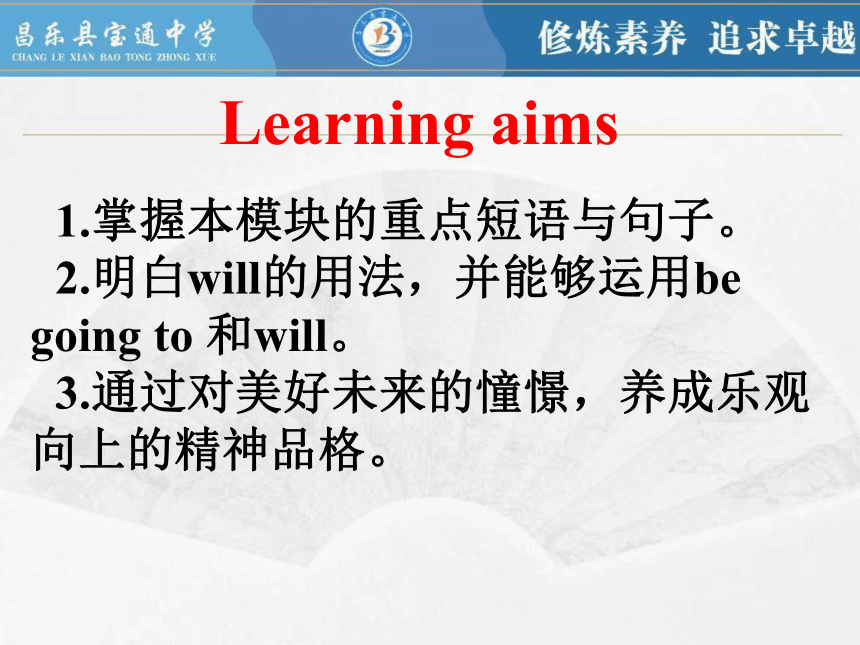

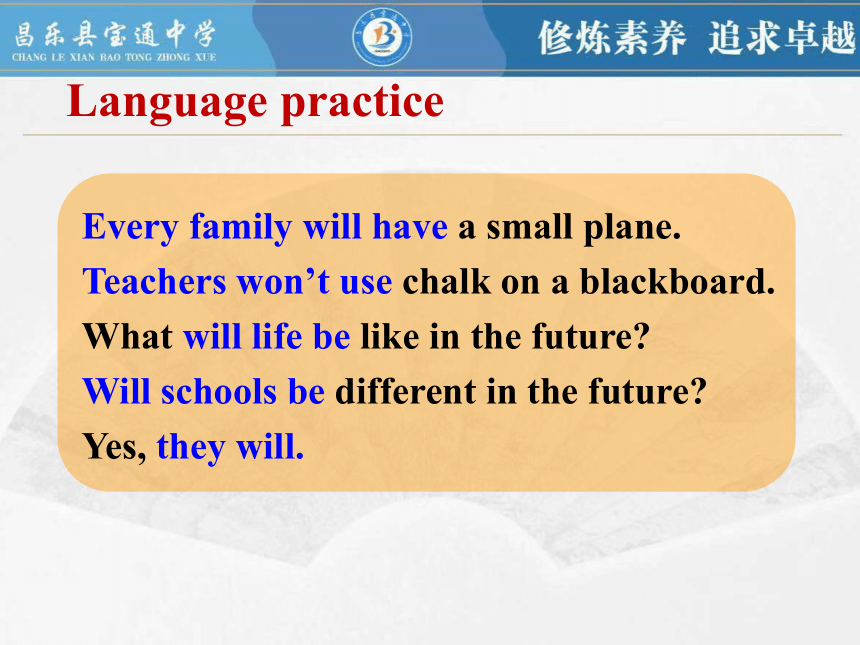
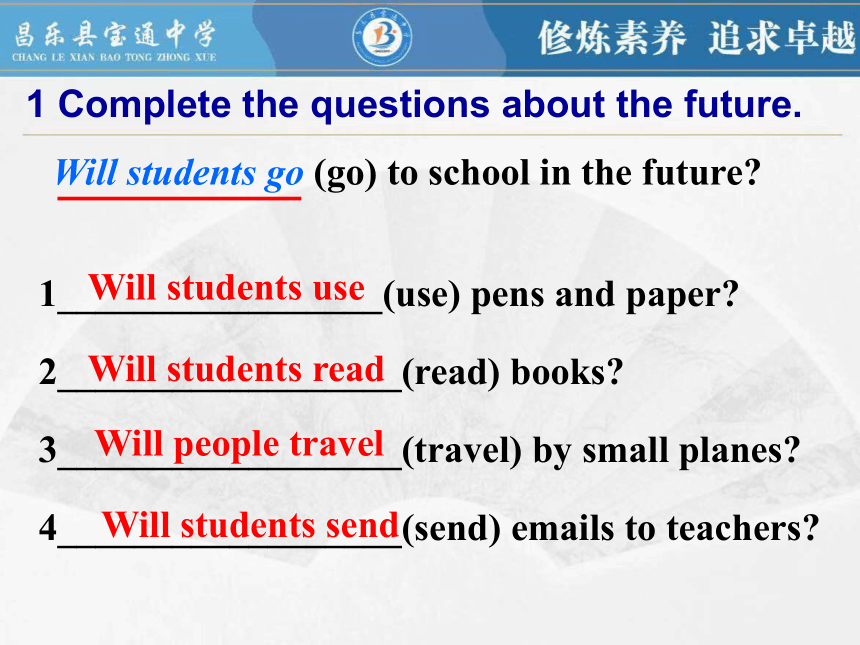
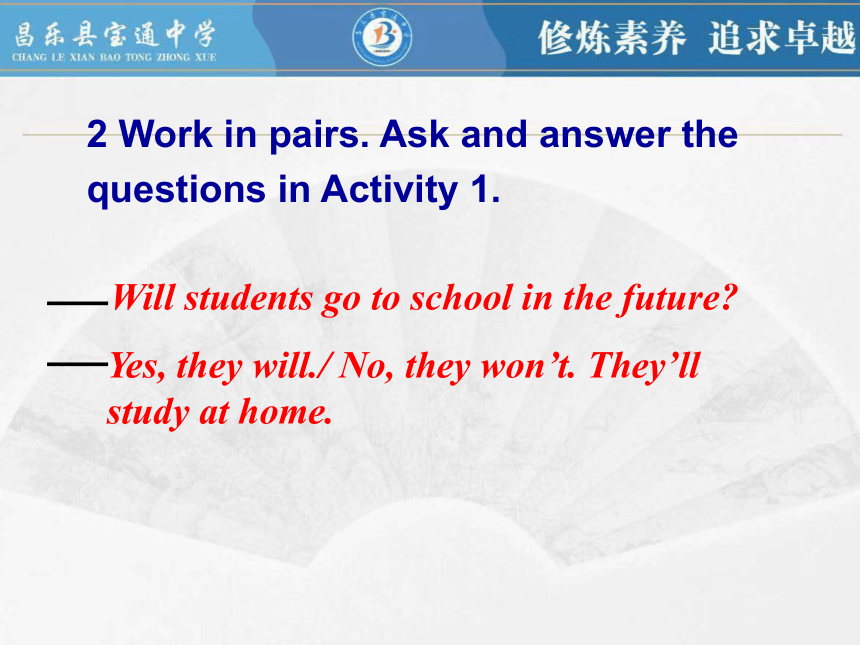
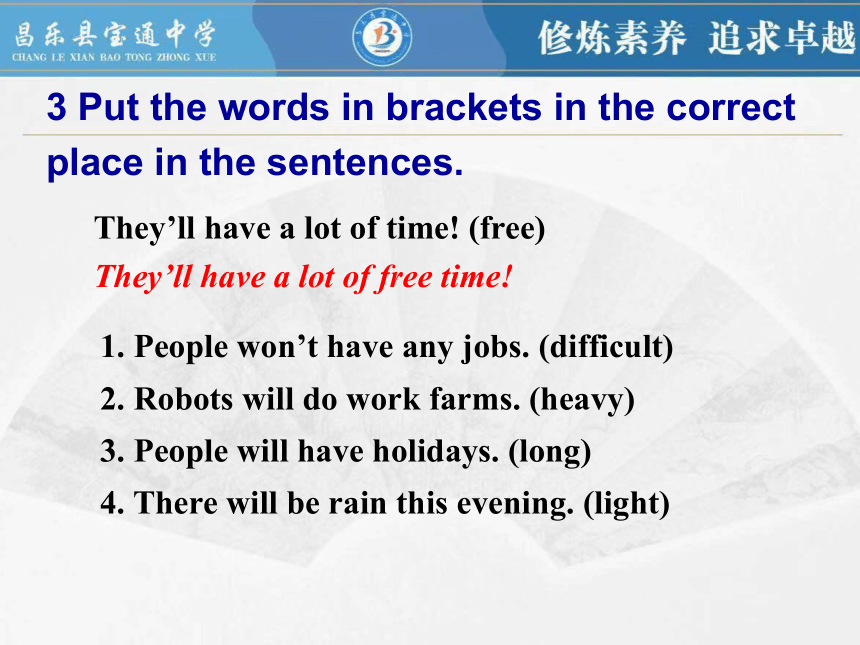
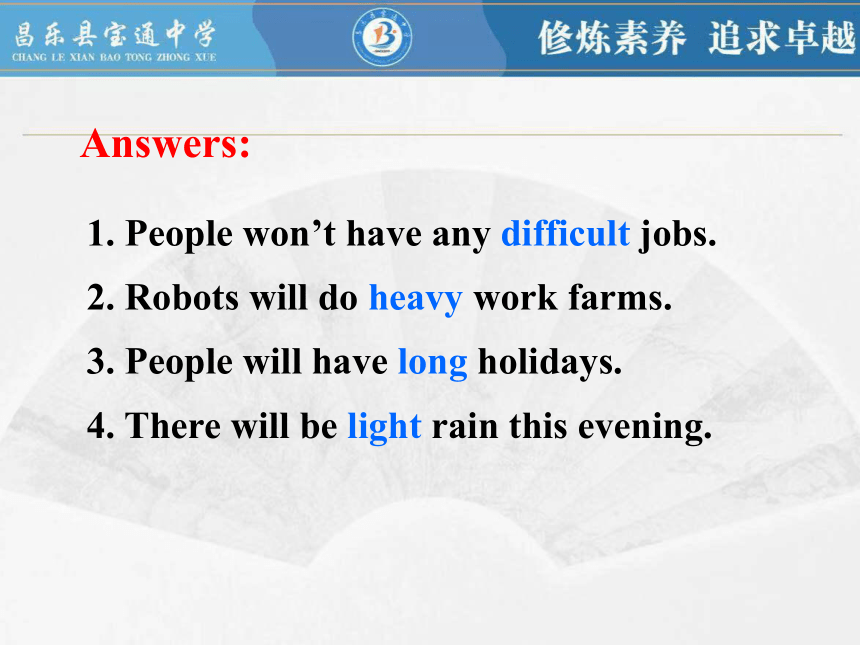
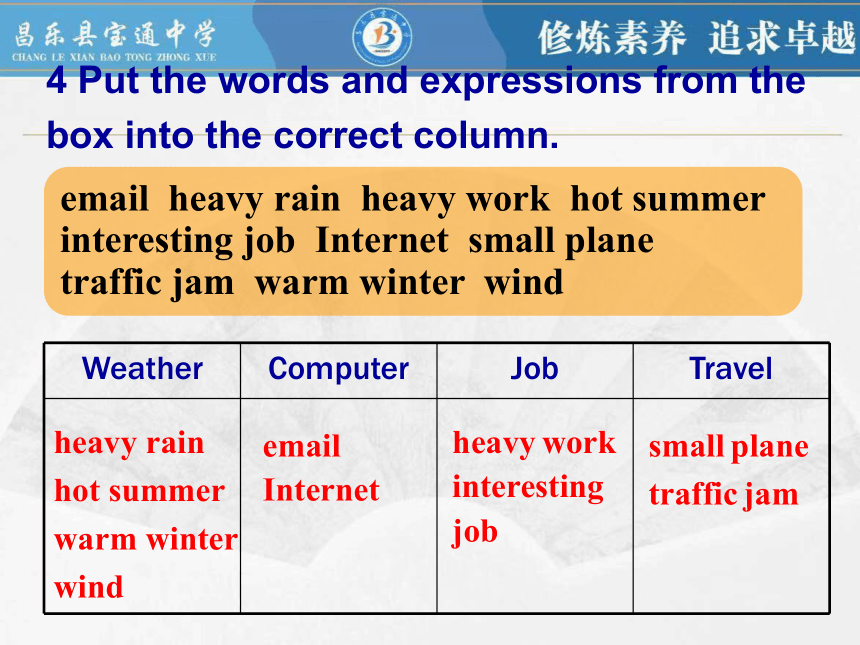
文档简介
(共24张PPT)
Module 4
Life in the future
Unit 3
Language in use
Learning aims
1.掌握本模块的重点短语与句子。
2.明白will的用法,并能够运用be going to 和will。
3.通过对美好未来的憧憬,养成乐观向上的精神品格。
板块一
Language practice
Every family will have a small plane.
Teachers won’t use chalk on a blackboard.
What will life be like in the future
Will schools be different in the future
Yes, they will.
1 Complete the questions about the future.
Will students go (go) to school in the future
1_________________(use) pens and paper
2__________________(read) books
3__________________(travel) by small planes
4__________________(send) emails to teachers
Will students use
Will students read
Will people travel
Will students send
2 Work in pairs. Ask and answer the
questions in Activity 1.
Will students go to school in the future
Yes, they will./ No, they won’t. They’ll
study at home.
3 Put the words in brackets in the correct
place in the sentences.
They’ll have a lot of time! (free)
They’ll have a lot of free time!
1. People won’t have any jobs. (difficult)
2. Robots will do work farms. (heavy)
3. People will have holidays. (long)
4. There will be rain this evening. (light)
Answers:
1. People won’t have any difficult jobs.
2. Robots will do heavy work farms.
3. People will have long holidays.
4. There will be light rain this evening.
4 Put the words and expressions from the
box into the correct column.
email heavy rain heavy work hot summer
interesting job Internet small plane
traffic jam warm winter wind
Weather Computer Job Travel
heavy rain
hot summer
warm winter
wind
email
Internet
heavy work
interesting
job
small plane
traffic jam
Robots in Japan
Japan has many robots now and you
can see lots of them in the country.
You can find worker robots, robots
that clean your home, and even
robots you can play with.
板块二
Work in groups to discuss the language
points.
小组内讨论并解决课文中出现的知识点,若
课文中仍有疑问可以做出标记,然后在全班讨论解决。
1.复习一般将来时will的用法。
结构:will + 动词原形(第一人称还可以用shall)
意义:表示将来要发生的事情。will本身没有人称和数的变化,如果要表达“将来不会……”就要用其否定形式,可以再will后直接加 ,可缩略为 。
他们将不使用书了。
含有will的there be 句型结构为: “将有……”
明天将会是晴天。
not
won’t
They won’t use books.
There will be
It will be a sunny day tomorrow.
2.复习一般将来时be going to 的用法。
结构:be going to +动词原形;意义:表示打算或计划做某事
I am going to play the piano.
含有be going to句型结构为:
+单数名词+其他
+ 复数名词+其他
There is going to be
There are going to be
3. will 与be going to 的区别
be going to 表示主观上近期的打算或计划,will表示客观上将来会发生的事情,will没有事先计划、安排过的意味。
We are going to have a test next week.
Every family will have a small plane in the future.
be going to还可以表示有迹象要发生的事情,如:It’s going to rain, so let’s hurry.
will还可以表示主观意愿,如:I will give you a present.
4.Will we find new ways to travel? (Activity 6)
ways to travel 旅行的方式
做某事的方式
__________________ = _____________________
way to do way of doing
如果表示的是未来的事实或对将来的预测等,
我们可以用“will+动词原形”来表示。will 没有人称和数的变化。如:
1) There will be a big park over there.
那边将建成一个大型的公园。
2) They will send their homework to the teacher
by email.
他们将通过电子邮件将作业发给老师.
一般将来时: will
点拨:
Be going to:
1. 表达打算或计划做某事,强调事先考虑好的意图.
2. 根据迹象来推测将要发生的事.
Will:
1. 表达未来的事实或将来的预测.
2. 表示未经事先考虑的意图.
3. 表示意愿.
The differences between be going to and will
2. 表示将来“不会”, 就用其否定式 “ will not /
won’t ”。 如:
I think everyone will study at home and will
use computers. They won’t use books.
我想人人会待在家里用计算机学习, 他们不
用课本。
3. 询问将来的事, 将will提到句首构成它的
疑问形式。如:
Will there be computers in school
学校里会有计算机吗?
助动词shall也可以表示“将;将要”,但它只用于第一人称。
We shall visit the Great Wall this summer holiday.这个暑假我们将去游览长城。
含有will的there be句型结构为:There will be…“将有……”
There will be another bridge between the two cities.两个城市之间将会建另一座桥。
板块三
1.Will you clean your room next week
2.What will you do next week
3.Who will take a walk this evening
4.There won’t be more cars in 2 years.
1.C 2.B 3.C 4.D 5.B 6.C 7.C
Practice in class
Make a summary
What have you learnt in this class
Write out your difficulties.
Module 4
Life in the future
Unit 3
Language in use
Learning aims
1.掌握本模块的重点短语与句子。
2.明白will的用法,并能够运用be going to 和will。
3.通过对美好未来的憧憬,养成乐观向上的精神品格。
板块一
Language practice
Every family will have a small plane.
Teachers won’t use chalk on a blackboard.
What will life be like in the future
Will schools be different in the future
Yes, they will.
1 Complete the questions about the future.
Will students go (go) to school in the future
1_________________(use) pens and paper
2__________________(read) books
3__________________(travel) by small planes
4__________________(send) emails to teachers
Will students use
Will students read
Will people travel
Will students send
2 Work in pairs. Ask and answer the
questions in Activity 1.
Will students go to school in the future
Yes, they will./ No, they won’t. They’ll
study at home.
3 Put the words in brackets in the correct
place in the sentences.
They’ll have a lot of time! (free)
They’ll have a lot of free time!
1. People won’t have any jobs. (difficult)
2. Robots will do work farms. (heavy)
3. People will have holidays. (long)
4. There will be rain this evening. (light)
Answers:
1. People won’t have any difficult jobs.
2. Robots will do heavy work farms.
3. People will have long holidays.
4. There will be light rain this evening.
4 Put the words and expressions from the
box into the correct column.
email heavy rain heavy work hot summer
interesting job Internet small plane
traffic jam warm winter wind
Weather Computer Job Travel
heavy rain
hot summer
warm winter
wind
Internet
heavy work
interesting
job
small plane
traffic jam
Robots in Japan
Japan has many robots now and you
can see lots of them in the country.
You can find worker robots, robots
that clean your home, and even
robots you can play with.
板块二
Work in groups to discuss the language
points.
小组内讨论并解决课文中出现的知识点,若
课文中仍有疑问可以做出标记,然后在全班讨论解决。
1.复习一般将来时will的用法。
结构:will + 动词原形(第一人称还可以用shall)
意义:表示将来要发生的事情。will本身没有人称和数的变化,如果要表达“将来不会……”就要用其否定形式,可以再will后直接加 ,可缩略为 。
他们将不使用书了。
含有will的there be 句型结构为: “将有……”
明天将会是晴天。
not
won’t
They won’t use books.
There will be
It will be a sunny day tomorrow.
2.复习一般将来时be going to 的用法。
结构:be going to +动词原形;意义:表示打算或计划做某事
I am going to play the piano.
含有be going to句型结构为:
+单数名词+其他
+ 复数名词+其他
There is going to be
There are going to be
3. will 与be going to 的区别
be going to 表示主观上近期的打算或计划,will表示客观上将来会发生的事情,will没有事先计划、安排过的意味。
We are going to have a test next week.
Every family will have a small plane in the future.
be going to还可以表示有迹象要发生的事情,如:It’s going to rain, so let’s hurry.
will还可以表示主观意愿,如:I will give you a present.
4.Will we find new ways to travel? (Activity 6)
ways to travel 旅行的方式
做某事的方式
__________________ = _____________________
way to do way of doing
如果表示的是未来的事实或对将来的预测等,
我们可以用“will+动词原形”来表示。will 没有人称和数的变化。如:
1) There will be a big park over there.
那边将建成一个大型的公园。
2) They will send their homework to the teacher
by email.
他们将通过电子邮件将作业发给老师.
一般将来时: will
点拨:
Be going to:
1. 表达打算或计划做某事,强调事先考虑好的意图.
2. 根据迹象来推测将要发生的事.
Will:
1. 表达未来的事实或将来的预测.
2. 表示未经事先考虑的意图.
3. 表示意愿.
The differences between be going to and will
2. 表示将来“不会”, 就用其否定式 “ will not /
won’t ”。 如:
I think everyone will study at home and will
use computers. They won’t use books.
我想人人会待在家里用计算机学习, 他们不
用课本。
3. 询问将来的事, 将will提到句首构成它的
疑问形式。如:
Will there be computers in school
学校里会有计算机吗?
助动词shall也可以表示“将;将要”,但它只用于第一人称。
We shall visit the Great Wall this summer holiday.这个暑假我们将去游览长城。
含有will的there be句型结构为:There will be…“将有……”
There will be another bridge between the two cities.两个城市之间将会建另一座桥。
板块三
1.Will you clean your room next week
2.What will you do next week
3.Who will take a walk this evening
4.There won’t be more cars in 2 years.
1.C 2.B 3.C 4.D 5.B 6.C 7.C
Practice in class
Make a summary
What have you learnt in this class
Write out your difficulties.
同课章节目录
- Module 1 Lost and found
- Unit 1 Whose bag is this?
- Unit 2 Are they yours?
- Unit 3 Language in use
- Module 2 What can you do ?
- Unit 1 I can play the piano
- Unit 2 I can run really fast
- Unit 3 Language in use
- Module 3 Making plans
- Unit 1 What are you going to do at the weekends?
- Unit 2 We're going to cheer the players.
- Unit 3 Language in use
- Module 4 Life in the future
- Unit 1 Everyone will study at home
- Unit 2 Every family will have a small plane.
- Unit 3 Language in use
- Module 5 Shopping
- Unit 1 What can I do for you?
- Unit 2 You can buy everything on the Internet
- Unit 3 Language in use
- Module 6 Around town
- Unit 1 Could you tell me how to get to the Nationa
- Unit 2 The London Eye is on your right.
- Unit 3 Language in use
- Revision module A
- Module 7 My past life
- Unit 1 I was born in a small village.
- Unit 2 I was born in Quincy.
- Unit 3 Language in use
- Module 8 Story time
- Unit 1 Once upon a time….
- Unit 2 Goldilocks hurried out of the house.
- Unit 3 Language in use
- Module 9 Life history
- Unit 1 He left school and began work at the age of
- Unit 2 He decided to be an actor.
- Unit 3 Language in use
- Module 10 A holiday journey
- Unit 1 What did you do?
- Unit 2 This morning we took a walk.
- Unit 3 Language in use
- Module 11 Body language
- Unit 1 They touch noses!
- Unit 2 Here are some ways to welcome them.
- Unit 3 Language in use
- Module 12 Western music
- Unit 1 It's so beautiful!
- Unit 2 Vienna is the centre of European classical
- Unit 3 Language in use
- Revision module B
